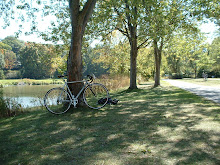I put together some details on this for a little project at work, and thought I'd post it up here as well.

Guess what – more and more research is showing that you can more to reduce your carbon footprint by going vegetarian, than by switching from an SUV to a hybrid car.
In 2006, the United Nations Food and Agricultural Organization released Livestock's Long Shadow, which identified the meat industry as a greater producer of greenhouse gases than the entire international transportation industry.
New Scientist magazine agrees, stating in 2008 that a family's food consumption accounts for double the greenhouse gases as their household driving habits.
The industrialized production of meat (approximately 15 billion animals each year in the U.S. alone) is an incredibly carbon intensive process. The problem begins with the fact that it takes 7 tons of plant protein (cows in industrial farms aren't fed grass, but soy, which can be eaten by humans) to make 1 ton of meat protein – resulting in 6 tons of wasted food (and wasted farmland, fertilizer, pesticides, oil/energy, and tremendous amounts of wasted water).
Not only does the production of meat create greenhouse gases, but by replacing forests (which act as carbon sinks to soak up C02) with farmland to grow soy for the animals, the meat industry reduces the planet's natural ability to absorb greenhouse gases. As well, cows account for approximately 40% of all the methane in the atmosphere.
In a February 2009 report, Stehfest et al state that the combined problems of methane, the C02 emissions caused by the meat industry, and the elimination of carbon sinks, are so significant that a worldwide switch to a vegetarian diet (however unlikely) would achieve the equivalent of $20 trillion spent on other climate change solutions (such as carbon sequestriation).
In Plan B 2.0: Rescuing a planet under stress and a civilization in trouble (looks like a version 3.0 was just released), Lester Brown writes that at a North American level of food consumption (ie heavy on meat), the planet can support 2.5 billion people, while at the other extreme, on the more veggie Indian diet, the earth could support 10 billion people (there are 6 billion people on the planet right now, with 9 billion expected by 2050).
Apart from greenhouse gas emissions, the industrialized meat industry creates many other environmental problems, including the toxic waste lagoons caused by pig farms (which create as much waste as cities the size of Cincinnati) and the reduction of oxygen levels in water bodies like the Gulf of Mexico, which kills all sealife in these areas.
Brown, L. (2006). Plan B 2.0: Rescuing a planet under stress and a civilization in trouble. Washington: Earth Policy Institute.
Nierenber, D. (2005). Happier meals: Rethinking the global meat industry. Danvers, MA: Worldwatch Institute.
Stehfest, E. & Bouwman, L. (2009). Climate benefits of changing diet. Climatic Change, published in Online First edition, Feb. 4, 2009.
Steinfeld, H. & Gerber, P. (2006) Livestock's long shadow: Environmental issues and options. Rome: Food and Agriculture Organization of the United Nations.
Trivedi, B. (2008). Dinner's dirty secret: your shopping basket is spewing greenhouse gases. New Scientist, 199(2673), 28-32.
PS - looks like the online version was titled What is your dinner doing to the climate?

3 comments:
This is really informative, thanks! I appreciate that you provide actual data and cite your sources!
What of the Omnivore's Dilemma and his conclusions that the industrial agriculture, as practiced by North Americans, is primarily corn based, thanks in large part to the government corn subsidies? He claims some soy is included in animal feed for protein (along with other animal protein) but that it all pretty much boils down to corn.
Great post! Love the citations, and really solid information!
Post a Comment